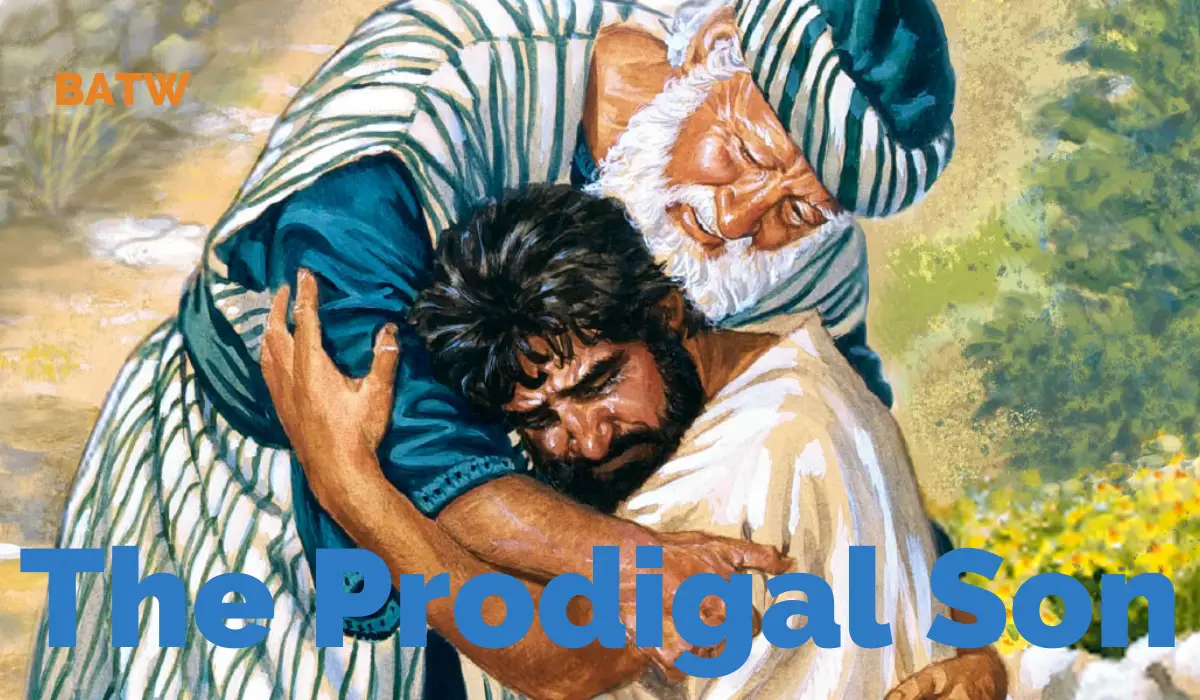Is The Parable of The Prodigal Son Biblical?
This phrase, the prodigal son is very popular with everyone but especially with Christians.
The Parable of the Prodigal Son may be one of Jesus’ most famous parables mentioned in Scripture.
It not only explains how the Lord focuses on the lost souls, but it also makes clear how and why Christians should receive and socialize with unsaved people.
Although above, I wrote that the Parable of the Prodigal Son is mentioned in Scripture, that is not quite true.
Who Was the First Person to Use the Phrase – Prodigal Son?
For nowhere in the Holy Bible will you find the word “prodigal”. It’s not there!
Thus, it leaves me to wonder, who was the first person to use the phrase prodigal son or the parable of the prodigal son?
I wonder!
However, the word “prodigal” means someone who wastefully, or recklessly and extravagantly spends his money, possession or wealth.
But that wasn’t the main message Jesus conveys with the Parable of the Lost Son.
The Parable of The Lost Sheep
So, Jesus uses three parables, in Luke 15:1-32, to educate Christians on how and why we should receive and socialize with unsaved people?
While Jesus was teaching the people the “publicans and sinners” came closer to him to hear him (Luke 15:1).
“Then drew near unto him all the publicans and sinners for to hear him” (Luke 15:1).
Then the religious people started to complain and pass judgment.
“And the Pharisees and scribes murmured, saying, This man receiveth sinners, and eateth with them” (Luke 15:2).
Consequently, Jesus tells the Parable of the Lost Sheep to educate these “Christians” of the importance of reaching the unsaved
The Three Parables Are One!
Utilizing the Parable of the Lost Sheep Jesus emphasizes the state of the sinner. He or she is lost.
Then, he magnifies how to recover him or her.
At first glance, his modus operandi may appear ludicrous. For who leaves ninety-nine sheep to search for one?
Naturally, we may be quick to say that they are more vulnerable to any danger on their own while the Shepherd is out searching for that one lost sheep.
To use a cliché, it’s more like being, “penny wise and pound foolish”.
But if we perceive spiritually what the Lord is teaching, we will change our minds.
First, Jesus uses the Parable of the Lost Sheep to establish something very important, the concept of being lost.
The Parable of The Lost Coin
“What man of you, having an hundred sheep, if he lose one of them, doth not leave the ninety and nine in the wilderness, and go after that which is lost, until he find it?” (Luke 15:4).
I don’t think any “man of you” would go after the one lost sheep and leave the others by themselves!
Next, he uses another parable immediately after this one to hammer home that one idea, of something lost.
This takes us to the Parable of the Lost Coin.
According to Luke the Beloved Physician, and he alone because no other of Jesus’ apostles capture these parables,
“Either what woman having ten pieces of silver, if she loses one piece, doth not light a candle, and sweep the house, and seek diligently till she finds it?” (Luke 15:8).
“And when she hath found it, she calleth her friends and her [neighbors] together, saying, Rejoice with me; for I have found the piece which I had lost” (Luke 15:9).
“Likewise, I say unto you, there is joy in the presence of the angels of God over one sinner that repenteth” (Luke 15:10).
This I could identify with and in my mind, I’m seeing my Mom doing just that!
Similar to how the shepherd left the majority of sheep to search for the lost one, this woman ignored her nine secured pieces of silver to search “diligently” for the lost one (Luke 15:8).
So far, we see from the Scriptures that Jesus is teaching about lost possessions.
Mainly, lost sheep and a lost coin.
The Parable of The Prodigal Son
Finally, immediately after the Parable of the Lost Coin, Jesus narrates the Parable of the Prodigal Son to the Scribes and Pharisees.
Find it in Luke 15:11-32.
Jesus tells us “A certain man had two sons” (Luke 15:11).
“And the younger of them said to his father, Father, give me the portion of goods that falleth to me. ... He divided unto them his living” (Luke 15:12).
“And not many days after the younger son gathered all together, and took his journey into a far country, and there wasted his substance with riotous living” (Luke 15:13).
“… When he had spent all, there arose a mighty famine in that land; and he began to be in want.” (Luke 15:14).
“And he went and joined himself to a citizen of that country; and he sent him into his fields to feed swine.” (Luke 15:15).
“And he would fain have filled his belly with the husks that the swine did eat: and no man gave unto him.” (Luke 15:16).
Why Is It Important That the Prodigal Son Comes to Himself?
“And when he came to himself, he said, How many hired servants of my father’s have bread enough and to spare, and I perish with hunger“? (Luke 15:17).
“I will arise and go to my father, and will say unto him, Father, I have sinned against heaven, and before thee,” (Luke 15:18).
“And am no more worthy to be called thy son: make me as one of thy hired servants” (Luke 15:19).
“And he arose, and came to his father. But when he was yet a great way off, his father saw him, and had compassion, and ran, and fell on his neck, and kissed him.” (Luke 15:20).
“And the son said unto him, Father, I have sinned against heaven, and in thy sight, and am no more worthy to be called thy son.” (Luke 15:21).
“But the father said to his servants, Bring forth the best robe, and put it on him; and put a ring on his hand, and shoes on his feet:” (Luke 15:22).
Did The Lost Son Realise That He Was Lost?
“And bring hither the fatted calf, and kill it; and let us eat, and be merry” (Luke 15:23).
“For this my son was dead, and is alive again; he was lost, and is found. And they began to be merry“. (Luke 15:24).
“Now his elder son was in the field: and as he came and drew nigh to the house, he heard musick and dancing.” (Luke 15:25).
“And he called one of the servants, and asked what these things meant“. (Luke 15:26).
And he said unto him, Thy brother is come; and thy father hath killed the fatted calf, because he hath received him safe and sound” (Luke 15:27).
“And he was angry, and would not go in: therefore came his father out, and intreated him. (Luke 15:28).
And he answering said to his father, Lo, these many years do I serve thee, neither transgressed I at any time thy commandment: and yet thou never gavest me a kid, that I might make merry with my friends: (Luke 15:29).
“But as soon as this thy son was come, which hath devoured thy living with harlots, thou hast killed for him the fatted calf. (Luke 15:30).
“And he said unto him, Son, thou art ever with me, and all that I have is thine. (Luke 15:31).
“It was meet that we should make merry, and be glad: for this thy brother was dead, and is alive again; and was lost, and is found. (Luke 15:32).
The Parable of the Lost Son
This Jesus did in teaching how to deal with the unsaved person.
Instead of saying the Parable of the Prodigal Son, I prefer to say the Parable of the Lost Son because that’s biblical.
We know that the Prodigal Son is lost because his father admits it.
He informs us, “For this my son was dead, and is alive again; he was lost, and is found” (Luke 15:24, 32).
He wasn’t physically lost like the sheep and the coin but he was lost nevertheless.
The Prodigal Son was lost because he was unaware of his identity and status.
As a result, the Holy Bible to reinforce the fact that he was lost says, “And when he came to himself” (Luke 15:17).
He could only come to himself if he was unaware of who he was!
He did not know that he was a Son of God!
Note that he didn’t come into enlightenment concerning his surroundings or what he was doing, but who he was.
Thus, he came to himself.
He finally realized that he was a Son of God. A Believer!
How to Find and Rescue the Lost?
Jesus uses the parables of the lost sheep, coin, and son, also informs how to find and rescue the lost soul.
Recall that he was addressing the Scribes and Pharisees, today, they are comparable to Christians, in this context (Luke15:2-3).
To identify and locate lost sinners and introduce them to Christ Jesus guides us.
Three Steps to Receive The Lost Son
Step 1:
The Church Should Make Monumental Efforts to Locate Sinners
- This always means leaving the four walls of your multi-million-dollar place of worship.
- Go where they are.
- Visit the communities, the playfields, and hangout spots and communicate Jesus Christ to them personally.
Step 2:
Spare No Resource in Locating and Reaching the Lost
- Lost Sheep: – The Shepherd didn’t rest until he finds the sheep.
- Lost Coin: – The woman was diligent in locating the lost coin
- She lights a candle
- She sweeps the house
- She seeks diligently until she succeeds
- Lost Coin: – The woman was diligent in locating the lost coin
Step 3:
Possess, Implement, and Execute an Effective “Welcome Home Plan”
- Lost Sheep – “And when he cometh home, he calleth together his friends and neighbours, saying unto them, Rejoice with me; for I have found my sheep which was lost.” (Luke 15:6).
- Lost Coin – “And when she hath found it, she calleth her friends and her neighbours together, saying, Rejoice with me; for I have found the piece which I had lost.” (Luke 15:9).
- Lost Son – Luke 15:20-32
- Welcome the lost with compassion and genuine emotions v20
- Place them in an atmosphere where they easily fit in V22
- Throw a welcome party for him/her v23
So, we realize that Jesus was teaching these religious folks that his focus is to save the lost.
According to Mark, that’s why Jesus tells the Scribes and Pharisees,
“They that are whole have no need of the physician, but they that are sick: I came not to call the righteous, but sinners to repentance” (Mark 2:17).
And using the three parables above he explains the length he goes to secure the lost son.
What is the Main Message of the Parable of The Prodigal Son?
Many people, Christians included, will inform us that the main message in this parable is forgiveness.
Others will admit that love is the chief lesson, but a few will even say it how not to spend your inheritance.
All these are secondary lessons that we could take home from this teaching.
However, it’s important to note that Jesus makes it his duty to teach only one main lesson in each of his “dark sayings”.
Do you recall what motivated Jesus to tell these parables?
The comments of the religious people. They complain about how Jesus receives and eats with unrighteous people.
Today, this is similar to contemporary Church folks saying, that we should separate ourselves from sinners.
But if we follow this admonishment, how could we lead them to Christ?
We couldn’t.
Did the Prodigal Son Repent?
Jesus, in responding to their “murmurings” tells all three parables. As we examine each, we will discover that the common message is being lost.
That is lost sheep, coin, and son.
Thus, Jesus uses them to teach that his focus is saving the lost.
He emphasizes this in all three parables by leaving the majority and searching for the lost one.
By doing this he demonstrates that the majority is “saved” and does not need-finding, but more importantly, it amply displays his focus to find and recover the lost.
A typical shepherd would not leave ninety-nine sheep by themselves to search for one.
Because he has more to lose leaving them on their own.
But Jesus is no typical shepherd. He’s the Good Shepherd. He knows that those left on their own are not exposed but safe because the Lord watches over them.
They are not lost. They are saved. But the lost one needs saving.
So, he goes out to seek and to save him.
It’s important to note that Jesus was not speaking of physically lost but spiritually.
The following verse reveals this:
“I say unto you, that likewise joy shall be in heaven over one sinner that repenteth, more than over ninety and nine just persons, which need no repentance” Luke 15:7
They are lost because they have not repented.
On the other hand, one person repents and heaven rejoices.
“Likewise, I say unto you, there is joy in the presence of the angels of God over one sinner that repenteth” (Luke 15:10).
In closing, repentance is at the heart of salvation for if we can’t repent we cannot be saved!




